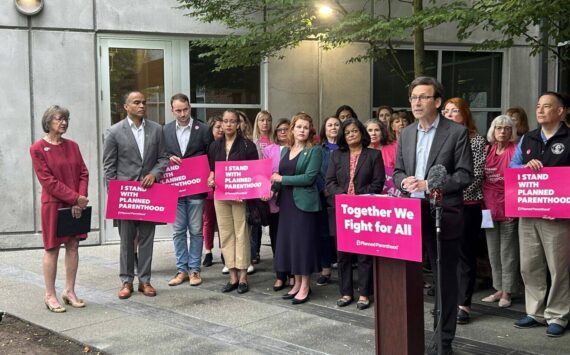If your business has staked a claim on the Information Superhighway, then you know a big decision was what type of Web hosting plan to use for your Web presence. Web hosting options are on a continuum, with a variety of choices that are ideally suited to organizations of different sizes, and at different levels of Web site sophistication.
When it comes to companies offering hosting choices, Tacomas Optic Fusion, a carrier-neutral co-location facility in the Perkins Building, runs the gamut from managed services to hands-off rack space.
We caught up with Rick Shanaman, President and CEO of Optic Fusion, to talk about the issues in Web hosting today, why connectivity prices may start to rise and the small businesses trend to own their own servers.
Q: Tell us about Optic Fusion and what makes your services different in the marketplace.
Shanaman: Optic Fusion is a local company in downtown Tacoma. We are the only full-service co-location data center in the South Sound. We man our facility 24 hours a day, so whenever you call on the phone, you always get a person. When you come down here day or night or need assistance with anything in the co-location field, we have someone here to help you.
The co-location connectivity field has been beat up pretty severely in the last year. When we started this company a little over two years ago, we decided to look at a different kind of model than was out there. We decided to offer a little more of a boutique shop approach, specializing in providing good service, listening to our customers and designing a program that works for their needs.
Q: How hands-on does a server owner have to be?
Shanaman: We have all kinds of customers here. For instance, we have the 1U or 2U folks who just say, Hey, I need fractional T1 connectivity and I basically need to be left alone. If there are any resets that need to be done, I can come do them myself. Theyre strictly looking for price.
We also have customers who are looking for more service. They need tape backup, tape rotation or swapping of cards. We provide all those services, too.
We even have a shared server with a number of Web sites and a mail server that we run for companies who say, We just want to outsource it all to one person who knows what theyre doing. We dont want to have an IT person on staff, so we rely on you guys to keep our Web site up and our mail server running. If we have a problem with a connection, wed rather call you guys and have you bill us hourly.
We also have full-on suites and cabinets for folks that are more into the ISP and ASP end, as well as some local companies that are run on point-to-point connections over the cities $100 million fiber network Click! Network.
Q: Do you see more small businesses getting their own little 1U or 2U servers to operate their own Web sites?
Shanaman: I think its the same as its always been. When you reach a critical mass where youre getting a lot of transactions or business on your Web site, you need to make that step from a shared or leased server onto something you own. I dont see a trend happening that way, other than a lot of people have equipment theyre familiar and comfortable with that they want to use, therefore they want to use their own servers.
Q: Is software an issue for you? Some people want to run Linux or certain kinds of databases. Do you support that?
Shanaman: We dont ever touch your information. Were like a hotel or a U-Rent storage place. You bring down whatever you want, whether its boxes of hammers or containers with basketballs. We dont care. We just put it in its place. Same with servers. We do offer troubleshooting services on the database end, but typically we dont touch your data or connection. What we do is make sure you have plenty of power coming to your location, that youre up all the time, that the generator is working and that there is security and staff here to handle any of your physical problems.
Q: Have you seen bandwidth fees dropping over the past year and do you see that continuing?
Shanaman: Ive seen the price drop as folks become more competitive. Weve seen a number of companies that provide connectivity go out of business. So the lack of competition has really stopped the price drop. I was reading an article the other day saying weve seen the bottom of the bandwidth pricing.
Q: Now were going to see it climb?
Shanaman: Yes, because even though we have lots of fiber running around, so much of it is not lit. Also, there is no more being added. We have lots of capacity now. But remember, everybody is locked into these long-term deals, so as were adding more people and capacity, were also not taking a lot of companies out of that pipeline. So down the road were going to see another scenario where well see prices rise because its just difficult to get connectivity.
Q: Will we see that here in Tacoma?
Shanaman: Qwest, who is the major Telco provider here, is starting to see the stretching of the limits of their network just for the simple fact that everybody wants more phone and data lines. I think weve seen prices bottom out. I dont think well see them drop much further. We may see some fire sales, but if youve noticed the fire sales weve seen are companies that have announced that theyre no longer going to be around.
Q: With Click! Network operating in Tacoma, have you seen a better price structure based on a municipal entity owning a fiber optic network in the city?
Shanaman: As far as point-to-point connections within the city absolutely. You can access point-to-point at fairly reasonable prices. As far as connectivity outside the city, that still remains an issue. Were working on a deal with AT&T to bring an additional fiber into the city so that we can have additional pathways and connectivity for the folks that come into our center. So its great within the city, but its a struggle, like any other city is struggling with, to reach out and connect with the rest of the world.
Q: Are your fiber connections wired up through the Weston Hotel in Seattle, which is the major hub?
Shanaman: Yes, the Weston Building, which is the second tower behind the hotel everybody is fighting to get back to that place. We want to have as much availability as we can there and we work closely with the folks at the Weston to develop diversity and pathways for our companies.
Q: Are there any other direct connections from Optic Fusion to other hubs across the country, like San Francisco or Portland?
Shanaman: Yes, were working on a scenario where we would run down through Olympia to Portland. Basically, you have to build a business case for any kind of build out these days. Thats the prudent way to do it. Actually, that was the prudent way to do it five years ago, too! Weve got numbers, weve got specs, and we know how to do it. Now we just need to put together the business case and go to the customers. You know, this business is funny. The more you buy, the cheaper it gets.
Q: As you talk to customers, what are the core issues in terms of Web site hosting?
Shanaman: We have one division that just does hosting and we have just straight co-location. With Web site hosting, we maintain that lower-priced product at $25 to $100 a month.
We dont want to compete with the folks that are in our co-location running a dedicated server. Whats happening right now in the market is we have a lot of folks planning for down the road. I think were going to see an echo boom. We saw, of course, a huge boom of anyone with a business plan on a napkin getting millions of dollars in funding and not worrying about turning a profit.
Those days are over. But we still have a lot of great ideas and business plans out there that are starting to get funded again. These are the guys who are serious. Weve seen a lot of guys who say, Scalability is what we want to do. We want to start off small. We dont need to rent 2,000 square feet of co-location space and put one server in it. We want to take a cabinet, then have the opportunity to expand it into a cabinet, then three cabinets and take on more as we grow. So were seeing how companies can take a T1 and turn it up to a DS3 and so on. Its on demand, rather than Gee, buy everything you need for the possible growth over the next five years. Those days are over. Now everything is more manageable and scalable.
Q: Didnt you just acquire a Web development company?
Shanaman: Wed been working with a company called Dynamics in Design. Theyve been building web sites for 4-5 years, specializing in the dentistry field. It was just a good time to join forces. Wed both been referring business to each other, so we decided to cut out swapping checks back and forth at the end of the month and we put everything under one banner.
They specialize in the lower end. Theyll do updates for $25-$50, all the way up to the full $5,000-$6,000 huge, interactive e-commerce site. They specialize in the mom-and-pop Web sites, so to speak, providing them all the services so they can have their Web site, e-mail, search engine registrations, they get an update per month and they know they can always get someone on the phone for tech support.
Q: Thats unique in the co-location space. Most dont get involved in the content side.
Shanaman: Yes. We try to keep it as a totally separate business. We try to help our customers out. If they need a point-to-point connection internally in the city and it doesnt even involve our co-location center, we are more than happy to achieve that at a highly competitive price.
More information on Optic Fusion is at their Web site at www.opticfusion.net. They are located in the historic Perkins Building at 1101 A Street St. 400, Tacoma, WA 98402; Phone: 253/274-1726.
Optic Fusion stretches Web services muscle
Tags: 253/274-1726, AT&T, carrier-neutral co-location facility, fiber network, fiber optic, Information Superhighway, interactive e-commerce site, ISP, Linux, mail server, Major, mom-and-pop Web sites, OLYMPIA, Optic Fusion, Perkins Building, Portland, president and CEO, Rick Shanaman, San Francisco, search engine, search engine registrations, Seattle, Tacoma, USD, Washington, Web development, Web Hosting, Web hosting options, web presence, Web services, Web site hosting, Web site sophistication, Weston, Weston Building, Weston Hotel, www.opticfusion.net






